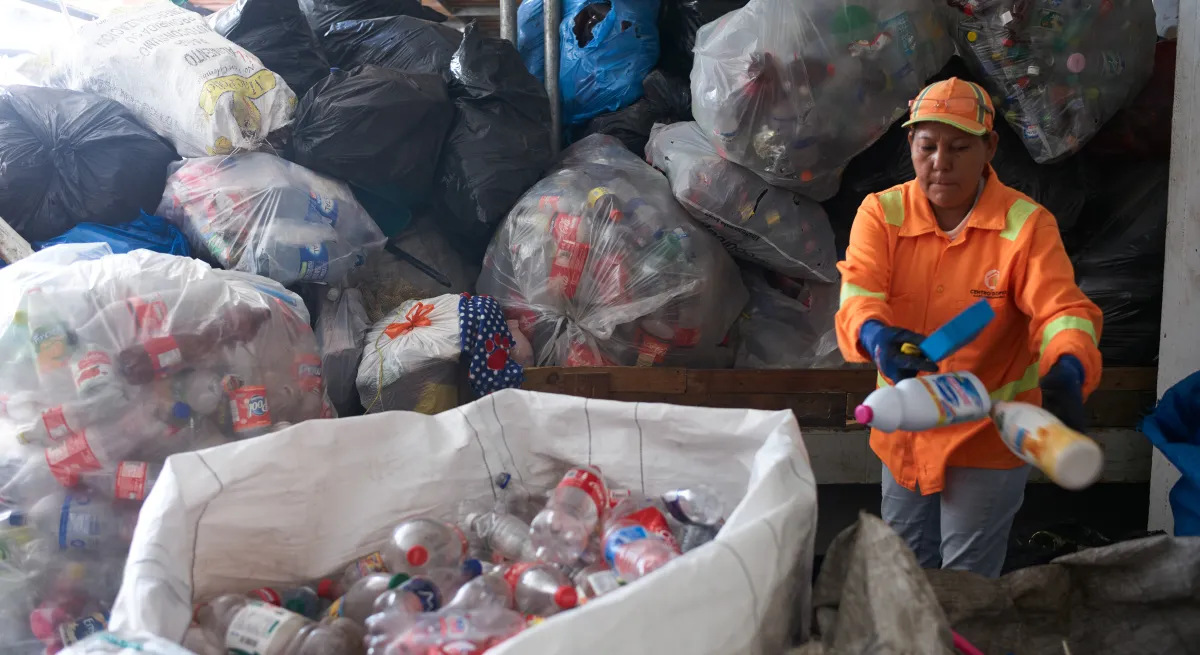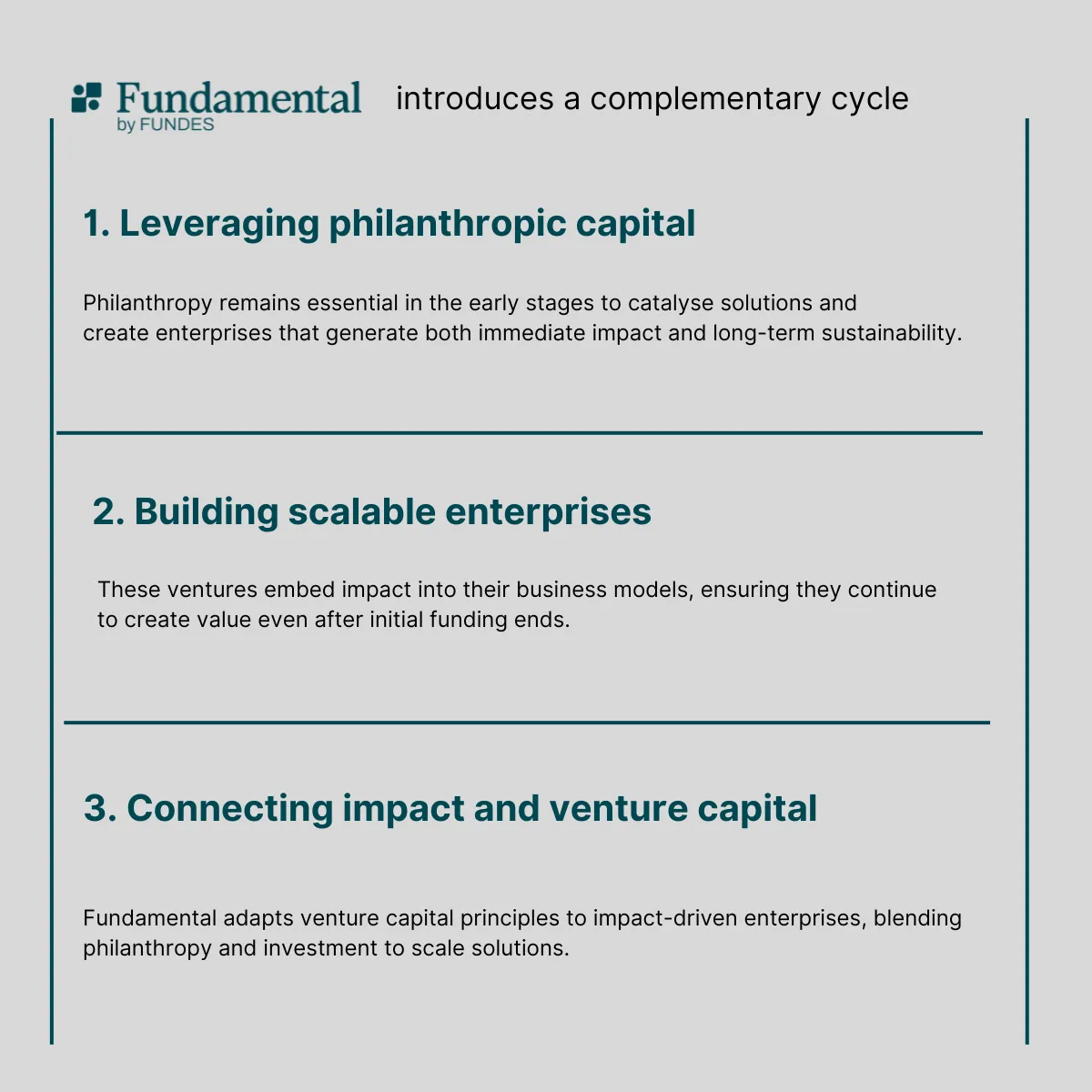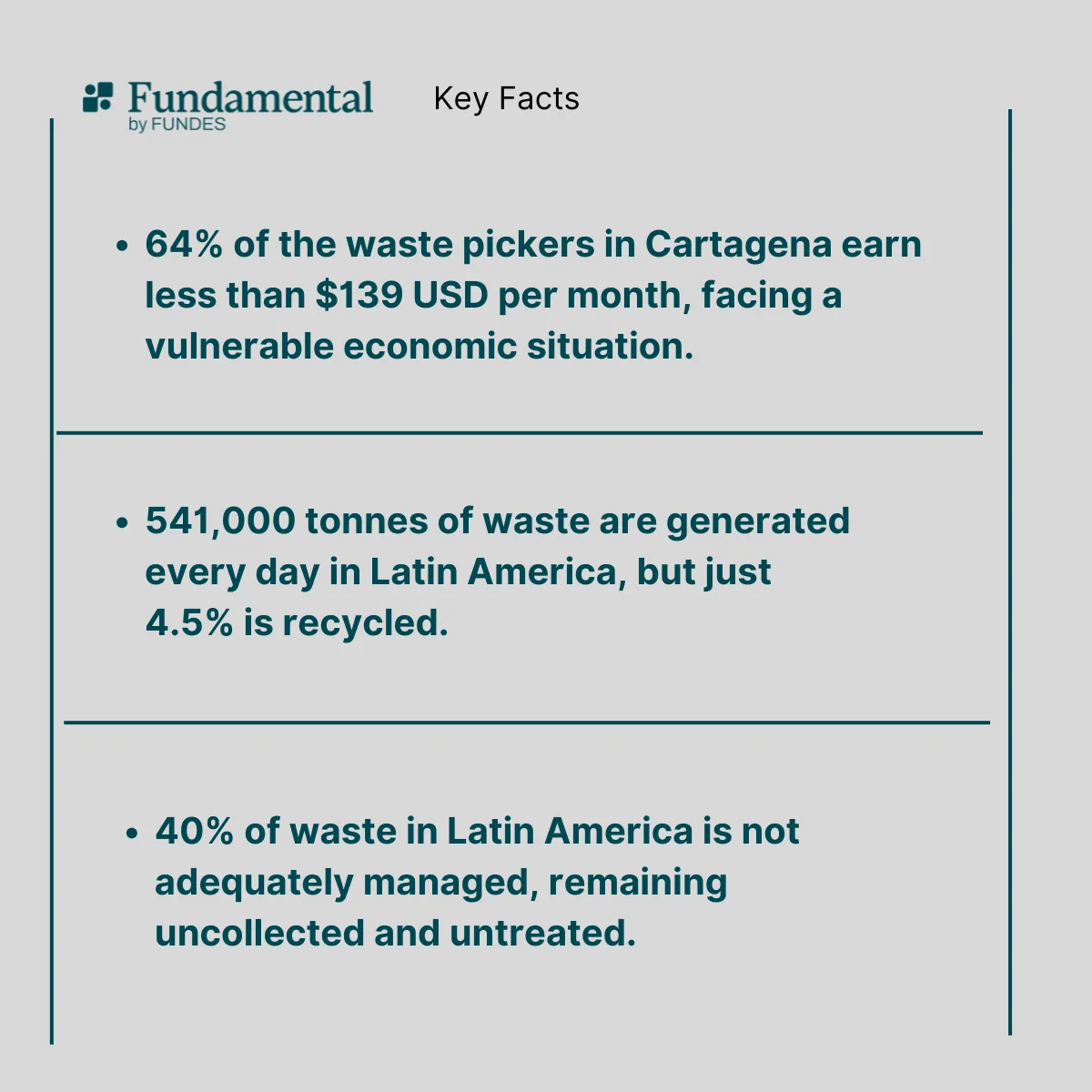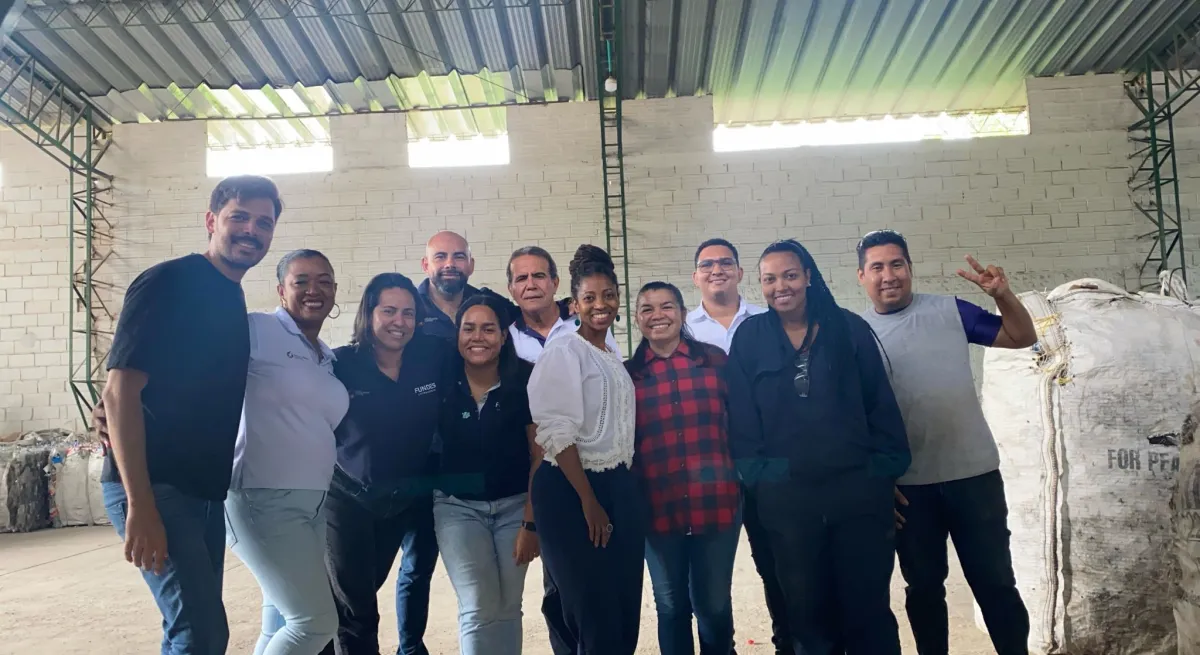- First, congratulations to Fundes and the team, on its remarkable 40 years of empowering small businesses in Latin America. Could you share with us the story behind the founding of Fundes and how it has evolved into the transformative force it is today?
Thank you! Reaching this milestone is deeply gratifying. It hasn’t always been an easy journey, but it’s been filled with learning, satisfaction, and above all, a constant challenge to the status quo and to ourselves. Reflecting on 40 years is inspiring, yet envisioning where we might be in 2064 is equally daunting and exciting.
FUNDES was a pioneer in what we now call ‘social enterprises’. In 1984, Swiss businessman and philanthropist Stephan Schmidheiny founded FUNDES with a bold vision to address Latin America’s most pressing challenges. At the time, the region faced immense structural issues: poverty, inequality, limited access to resources and a lack of opportunities for economic advancement. While philanthropy could have been a straightforward approach, our founder chose a different path—one grounded in applying business principles to create systemic solutions.
In essence, Schmidheiny was playing the role of an early ‘impact investor’, providing catalytic capital to power a social enterprise. At the time, we might not have fully understood it in those terms, but in hindsight, it was a forward-thinking bet that resonates strongly with today’s context, where impact investing is widely recognized as a transformational approach.
From the very beginning, there was a deliberate focus on Latin America. FUNDES didn’t take a one-size-fits-all approach; instead, it deeply engaged with the region, creating a profound understanding of its unique challenges and opportunities. This regional focus has been a cornerstone of FUNDES’ impact and its ability to adapt over time.
The foundation of FUNDES rested on three key ideas. Firstly, harnessing the power of micro and small businesses (small businesses). These businesses, while often overlooked, were seen as critical agents of change, capable of fostering access, equity and local economic growth. Then, building economic capacity. The focus was on empowering small businesses to create value—through profitability, innovation, job creation and meeting demand. Finally, demonstrating market value. FUNDES operated as a platform to identify market failures and prove that solutions to these failures could generate both social impact and business value.
Over the years, this formula has been repeated and refined. Latin America’s challenges—unemployment, inequality, and underdeveloped ecosystems—were the starting point. Then solutions were designed to empower small businesses to leverage and drive sustainable development, with philanthropic capital acting as a catalyst to develop these solutions. And finally, these solutions were tested for "product-market fit" to ensure they created value and could integrate into business ecosystems.
For example, in the first 20 years, FUNDES experimented with initiatives like credit guarantees, training and consulting services. Eventually, the consulting model proved to be the most effective. Large companies across Latin America faced limitations in efficiency and productivity when working with small businesses—whether as suppliers, distributors, or clients. FUNDES addressed this market gap by offering consulting services that improved the competitiveness of these businesses while helping corporations achieve greater sustainability and profitability.
This iterative process has allowed FUNDES to address new challenges, adapt to different industries and continuously evolve. It’s also what led us to create Fundamental as a complementary model—one focused on building scalable social enterprises that embed this cycle of impact into their business model.

2. When Fundes took the innovative step to launch Fundamental in 2021, what inspired this venture studio model and how is it progressing? From a philanthropist’s view, what are the benefits with this new model?
Fundamental was born from the realization that we needed to challenge the status quo... again! Why should projects or programs that create significant impact come to an end simply because funding cycles do? This question drove us to think differently about sustainability and scale.
FUNDES played a critical role as a co-founder of Fundamental, alongside exceptional social entrepreneurs like Corentin Larue and Maxime Braun, who bring essential skills, knowledge and energy to this model. Personally, I’m proud to be a co-founder as well, contributing 25 years of experience iterating the cycle of impact that FUNDES has perfected. Together, we created Fundamental to apply and extend this knowledge to the venture studio model.

Here’s how our ventures demonstrate this approach:
- Ékole: A sustainable food brand that sources healthy snacks and groceries from small, local producers in Mexico and Peru. By reinvesting profits into these communities, Ékole strengthens local producers and promotes resilience in the food supply chain.
- Voalá: A platform that empowers low-income women in Guatemala to establish beauty businesses through micro-franchises. Voalá provides access to a product marketplace, certified training and mentoring, helping women achieve financial independence and build professional confidence.
- Simón: A mobile learning app for micro-entrepreneurs and front-line workers in LATAM. Using a ‘TikTok-style’ format, it delivers interactive training through gamification and rewards, enabling small business owners and workers to upskill within corporate value chains.
- Trófica: An end-to-end recycling service in Colombia that works with informal waste collectors, optimizing recycling processes and improving livelihoods in the waste management sector.
From a philanthropist’s perspective, this model offers a way to overcome the limitations of traditional philanthropy. While conventional projects often end after 2–5 years due to funding constraints (or the ‘rules of the game’ in the philanthropic world), Fundamental bridges this gap. It builds enterprises with inherent sustainability, allowing the impact to continue and grow.
The Julius Baer Foundation is an excellent example of how this approach works. Their support not only makes them an indispensable partner for Trófica but also played a pivotal role in FUNDES’ transition and in creating Fundamental itself.
Fundamental is still young—just three years old. But as part of the FUNDES family, we hope to be sharing many success stories in the decades to come.
Reciclamos Juntos has now evolved into Trófica, a business-to-business waste collection service, creating a new chapter in its journey and further integrating Trófica into Cartagena's recycling ecosystem.
3. One of the projects of Fundamental has been Reciclamos Juntos, which seeks to set up a sustainable recycling network to empower waste pickers in Cartagena. How does this initiative specifically work to reduce wealth inequality and improve the lives of those in the recycling ecosystem (on both sides)?
At its core, Reciclamos Juntos is a network - one that sustains, strengthens and streamlines Cartagena’s recycling ecosystem. By fostering relationships between waste generators, waste pickers, recycling centres and recycling plants, Reciclamos Juntos increases access to larger waste volumes, enabling higher earnings for waste pickers, and creates a system where every participant benefits, promoting a more equitable distribution of incomes.
Reciclamos Juntos has now evolved into Trófica, a business-to-business waste collection service, creating a new chapter in its journey and further integrating Trófica into Cartagena's recycling ecosystem.
This has been achieved by creating efficient collection routes to ensure that waste pickers are able to reach the largest possible volume during their assigned route. Then we connect informal waste pickers to recycling centres and help the centre leaders develop waste picker retention strategies to reduce turnover in a highly volatile environment. We also focus on capacity-building for sustainable, long-term growth, empowering recycling centre leaders to become recycling entrepreneurs and drive the future growth of their organisations and improve the livelihood of their waste pickers.
This three-phase approach focuses on business training to fuel future growth, technical training to access higher material prices and social training and connection to social support resources.
Additionally, Reciclamos Juntos connects its network of recycling centres and waste pickers to the broader Colombian recycling market. Trófica’s bodega commercialises the PET plastic generated in the original Reciclamos Juntos recycling centre network. Selling material to Trófica ensures that recycling centres gain preferential buying, access to working capital loans, access to motorized transportation and participation in incentive benefits for their waste pickers. These initiatives increase the amount of volume generated by recycling centres, ensuring that waste pickers increase their incomes. Throughout the Reciclamos Juntos project and today in Trófica’s new model, the team supports its recycling centres in reaching the volume and quality requirements needed to sell recyclable material to its network of three multi-material recycling plants. This capacity-building ensures that recycling centre leaders are able to access better pricing for these materials in comparison to selling to informal intermediaries.
By creating efficient routes, building organisational capacity and enabling strategic commercialisation benefits, Trófica provides a personalised support system that directly increases waste pickers' incomes and formalises working conditions, helping to address wealth inequality and its impacts in Cartagena's informal recycling sector.

4. Could you elaborate on what this evolution of Reciclamos Juntos into Trófica means for the project’s mission and its contributions to creating a more equitable and sustainable recycling value chain?
Trófica’s waste trading model links commercial FMCG partners seeking to boost the regional supply of recyclable material (which faces shortages and competition that result from a highly informal system) to the key needs of the recycling centres in its network. For example, Trófica is currently in a commercial partnership with Postobón, a Colombia-based FMCG company looking to ensure growth of the recycled PET market to achieve 2030 recycling and recycled content milestones. This partnership includes a purchase agreement for 30T of PET plastic per month with the plastic recycling plant in Postobón’s value chain, and the provision of 15 motorised tricycles to boost volumes of material managed by Trófica’s recycling centre network.
High demand for recycled plastic to meet 2030 targets drives interest from FMCG companies in exclusive access to material and strengthening of collection value chains - where Trófica is ideally positioned in the market.
This model also enables the provision of short-term working capital loans to recycling centres, ensuring that they are able to purchase more material from their waste pickers (who thus gain a larger income). This cashless system integrates loan repayments in Trófica’s buying process, reducing risk to capital flow by allowing recycling centres to pay their loans weekly through the sale of PET material to Trófica.
Trófica’s micro-credit pilot, which deployed $2.100 USD across 6 recycling centres, demonstrated remarkable potential: a 43% MoM growth in PET delivered to the Trófica bodega. This highlights the dual potential of micro-credits to serve as both an impact and commercial strategy, enabling recycling centres to purchase more material from its waste pickers. Looking forward, we see potential to open channels for similar investments into recycling centre infrastructure, enabling necessary changes that could significantly expand each centre’s material processing capacity.
5. The Julius Baer Foundation has played a crucial role in funding “Reciclamos Juntos” and its evolution into Trófica. How vital has this support been in addressing wealth inequality and building a more inclusive recycling ecosystem in Cartagena?
Reciclamos Juntos began its journey with a bold vision: to transform Cartagena’s informal waste collection sector by building trust and fostering social mobility with communities of informal waste pickers. The Julius Baer Foundation, as a founding partner of Reciclamos Juntos in 2020, was instrumental in designing, developing and refining the groundwork for Trófica’s current model and enabling its launch in 2024.
At its core, Reciclamos Juntos focused on forging relationships with the people it served. For the three years of project operations, the team immersed themselves in the field, visiting 30 recycling centres and engaging with 600 waste collectors weekly. This consistent presence allowed the team to earn the community’s trust, a vital accomplishment in overcoming initial scepticism.
Julius Baer's wealth inequality approach was key in structuring our approach to the different dimensions of value propositions for waste pickers. It led to the project team developing personal relationships with the waste pickers, understanding individual challenges and the solutions that could lead to true upward social mobility. The field visits and active feedback of the Julius Baer Foundation throughout this project phase was what led to the collective ‘aha’ moment of truly understanding what social mobility looks like within the informal waste picker community, highlighted by key success cases and the observation of growth year after year in the recycling centres in Reciclamos Juntos’ network.
The role of trust extended beyond the field and into partnerships. The Julius Baer Foundation exemplifies the principles of trust-based philanthropy, allowing the project team the flexibility to innovate and grow. At the end of the first phase of the project, we asked them for an additional grant to guarantee the permanence and scalability of the model. We promised to transform Reciclamos Juntos into a high-impact social enterprise, and the Julius Baer Foundation team recognized the potential of amplifying our past shared impact with a model with increased permanence, scalability and financial sustainability. They challenged us, believed in us and gave us significant 3-year financing, which gave the team the resources and time necessary to fulfil the promise. We can’t emphasize enough the relevance of having the right partners on board.

6. Looking ahead, what is your vision for Fundamental and projects like Trófica? How do you plan to continue addressing the gap between privileged and disadvantaged communities while fostering equal opportunities?
As an impact venture studio, our mission is at the core of everything we do: to continuously create social enterprises that serve disadvantaged populations.
How will we achieve this? Over the past three years, we've established a robust venture-building methodology that includes an impact dimension, developed our own technology with a focus on vulnerable user groups, assembled a passionate and talented team and formed strategic partnerships that align with our vision. We have a strong commitment to learning from each social business we develop and leveraging those insights. As a result, we have built a promising portfolio of four startups, including Trófica.
Looking ahead, we will build on this foundation we’ve created driven by our key goals. Firstly, to achieve Product-Market Fit with all of our existing ventures. Our mission is to ensure that the four ventures in Fundamental’s portfolio today are not only viable but scalable, amplifying both business success and social impact and ensuring their sustainability, making them ready to receive impact investments. Then to building new solutions as we firmly believe in the transformative power of innovative business models and emerging technologies to address pressing social challenges. In the next five years, we aim to launch at least five more social enterprises, bringing the total number of ventures in our portfolio to ten.
Our vision is to make a measurable difference by transforming 10,000 micro and small businesses in Latin America, serving 100,000 individuals and creating 5,000 new jobs. Ultimately, we are focused on closing the opportunity gap by empowering individuals and communities that have traditionally been left behind, paving the way for a more inclusive, equitable future.
We are aware that this is not a path we can walk alone - hence, we share our experiences with other actors in the field. Strengthening and creating partnerships such as with the Julius Baer Foundation will be key in the process as we hope to learn and also inspire others to develop social innovations and businesses as the norm in the future.
